
Final Presentation



April 12, 2024


▪ The RoundUp
▪ Commercial Beef Unit
▪ Equine Unit
▪ Purebred Beef Unit
▪ Bison Unit
▪ Extensive Grazing
Commercial Unit
▪ Dairy Unit


Final Presentation



April 12, 2024


▪ The RoundUp
▪ Commercial Beef Unit
▪ Equine Unit
▪ Purebred Beef Unit
▪ Bison Unit
▪ Extensive Grazing
Commercial Unit
▪ Dairy Unit



Round Up Team:
- Kamryn Gilliland – Chair
- Dylan Fuller- Purebred Representative
- Ashley Tolsma - Purebred Representative
- Karlin Rennie – Commercial Representative
- Emily Rumpf – Extensive Commercial Representative
- Jenna Moore – Equine Representative
- Hailey Nelson - Equine Representative
Round Up Expenses 23/24:
Thank You to Our Buyers:
- Orval Hayes
- Lee Marvin Farms
- Marcel Peter
- Eastligt Farms & Feedlot
- Shady Lawn Stock Farm
- Mel Dary
- Derek Sargeant
- Stalwick Livestock Ltd.
- Bar JL Farm and Ranch
- Tristen Mitchell
- Country Lane Angus
- Ken Leskow


Alycia Coultes General Manager
Jessica Leonard Secretary
Karlin Rennie Roundup Coordinator
Cole Seidel Reproduction Coordinator
Carter Byvank Mixed Farm Coordinator
Courtney Montgomery Health Coordinator
Alexia Porozni Treatment Coordinator
Elizabeth Jones Research Coordinator
Ella Hiebert Nutrition Coordinator
Justin Meston Risk Management Coordinator
Kiera Schlaut SOP Coordinator
Matthew Unger Range and Forage Coordinator
Megan Pfeffer Facilities Coordinator
Riley Engel Marketing Analyst
Tamara Westergaard Public Relations Coordinator
Taylor Hynds Current Events/ Inventory Coordinator
Timothy Mourtis Finance Coordinator
Meghan Lees Herdtrax/Records Coordinator
Bevin Hamilton Faculty Advisor
Kyle Hafner Farm Team Advisor
The 2023-2024 Commercial Beef Unit is in its 12th year as part of the Student Managed Farm. Our team consists of 18 members all spanning from Ontario to Alberta. Our team has been enjoying our time together and have been working hard on our herd from the start of the year.
“Striving to raise quality beef through educational opportunities and hands-on experience, while creating relationships within industry.”
- To improve genetics through culling and bull purchases.
- Complete a monthly finance report on year-to-date.
- Maintain team bonding and get to know each other outside of SMF.
- Decrease our open rate to the industry standard of 4% or less.
- Maintain a medium frame size for our selection criteria.
- Have the whole team do an analysis on all decisions.
- Support and encourage team members with your experience and knowledge.
- Keep production records and inventory updated using Herdtrax.
- Strong team dynamic
- Expanding industry knowledge
- Brand recognition
- Team size
- Drought
- Economies of scale Opportunities Threats
- Working with other SMF teams & producers
- Different marketing opportunities
- Resources and facilities
- Feed and pasture availability
- Global economic factors
- Potential disease outbreaks
- During the 2022-2023 calving season the commercial team we had to change the death loss to a 7% due to missing a steer calf out in pasture, calving complications, chronic pneumonia, and euthanasia due the cold winter last year. The 2023-2024 calving season has been successful with a 1.1% death loss, we unfortunately had to euthanize a calf due to it being born with deformities, reason for euthanizing was for animal welfare.
- We changed our vaccination program to try and prevent scours and help reduce our death loss for our January 2024 calving season which has so far been a success.
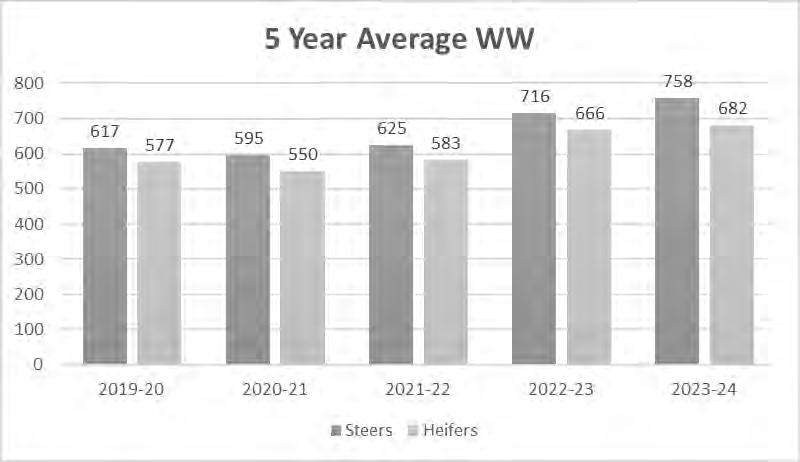
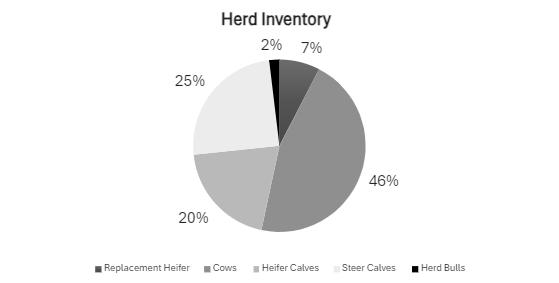
*Scores above 3 indicate mature for breeding, 2 indicates approaching maturity, 1 indicates immature.

This year cost of production is a little higher sitting at $2.22 per pound of weaned and sold calf as where last years was $1.86, we believe that this is because of the increase in things like our feed cost the number of animals we sold, our pasture rent going up and of course our vet cost going up. Next year's cost of production should be about the same or lower, as we are expecting a rise in cost but also a rise in calf prices again.

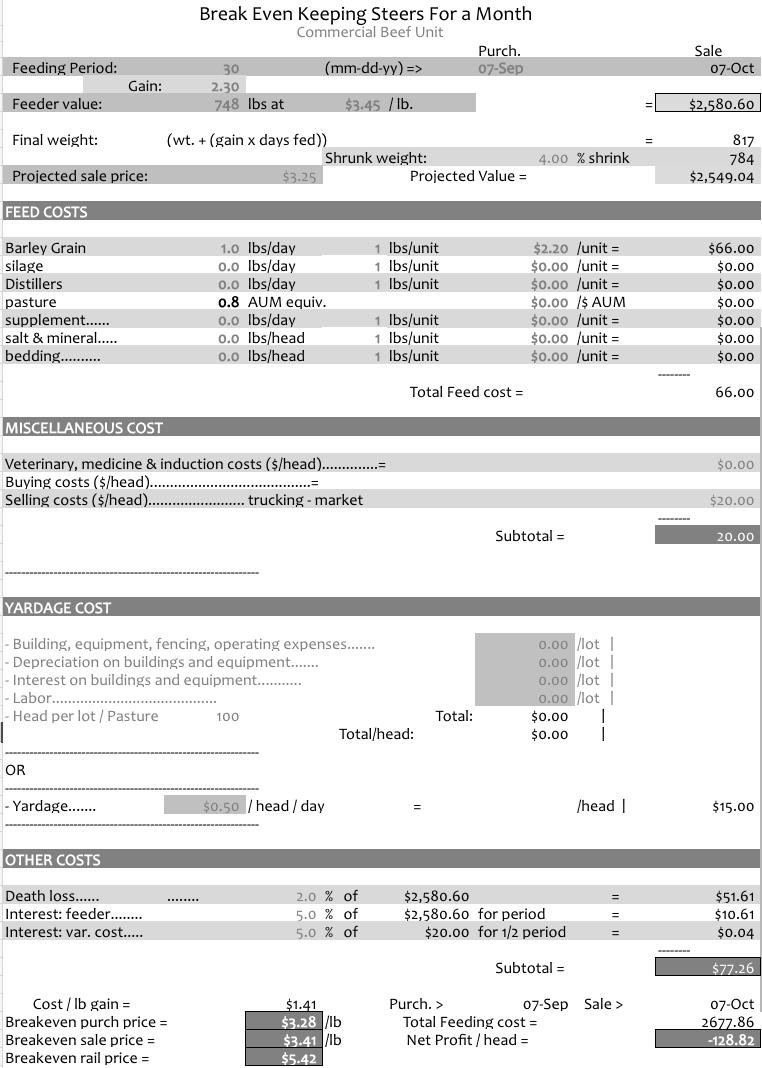
Recommendations For Next Years Team
- Continue Nasalgen on calves
- Visit pasture and cow herd in fall
- More communication with other beef teams
- Physical vote on big decisions
- Maintain 2 meetings a week.
- Use teams to send out agenda
Thank you to everyone that helped us this semester!
New Holland Agriculture
Dr. Tim Goodbrand
Bevin Hamilton
Flashpoint Electric
StudeBaker Industries
Irone Goose Metal Works
Anderson Bred Heifers
Canadian Western Agribition
Denise Martin
KMB Imagery
Sharon Reiter
Diamond K Customs
Erika Moore
Vermilion Vet Clinic
More Than Just Feed
Ryley Noble
JGL Livestock
MCF Feed Yards
George & Laura Baxter
CL Ranches
Farm Staff
Kris (Leroy) Lehmann
Kyle Hafner
Janet Kerr
Austin Partington
Amy Stanley
Other SMF Units
Tracy Quinton (T-Money)
Vermilion Livestock Exchange
JBL Livestock
Lakeland College Bookstore
Jim Pulyk
Trish Mechor
Everest Trucking Ltd.
Carson Sidener
Nadine Farkash
JBS Canada
Quarter Circle X Ranch
Barr Ag
DLMS
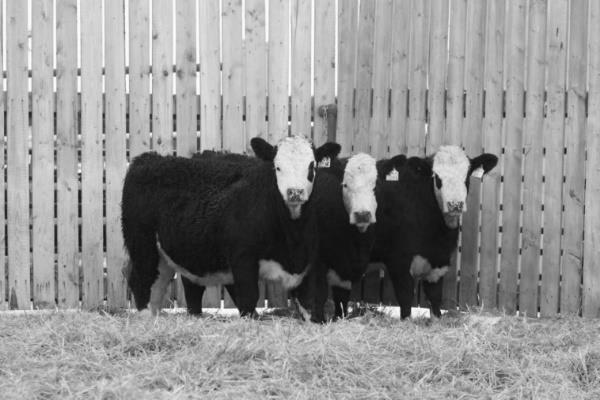
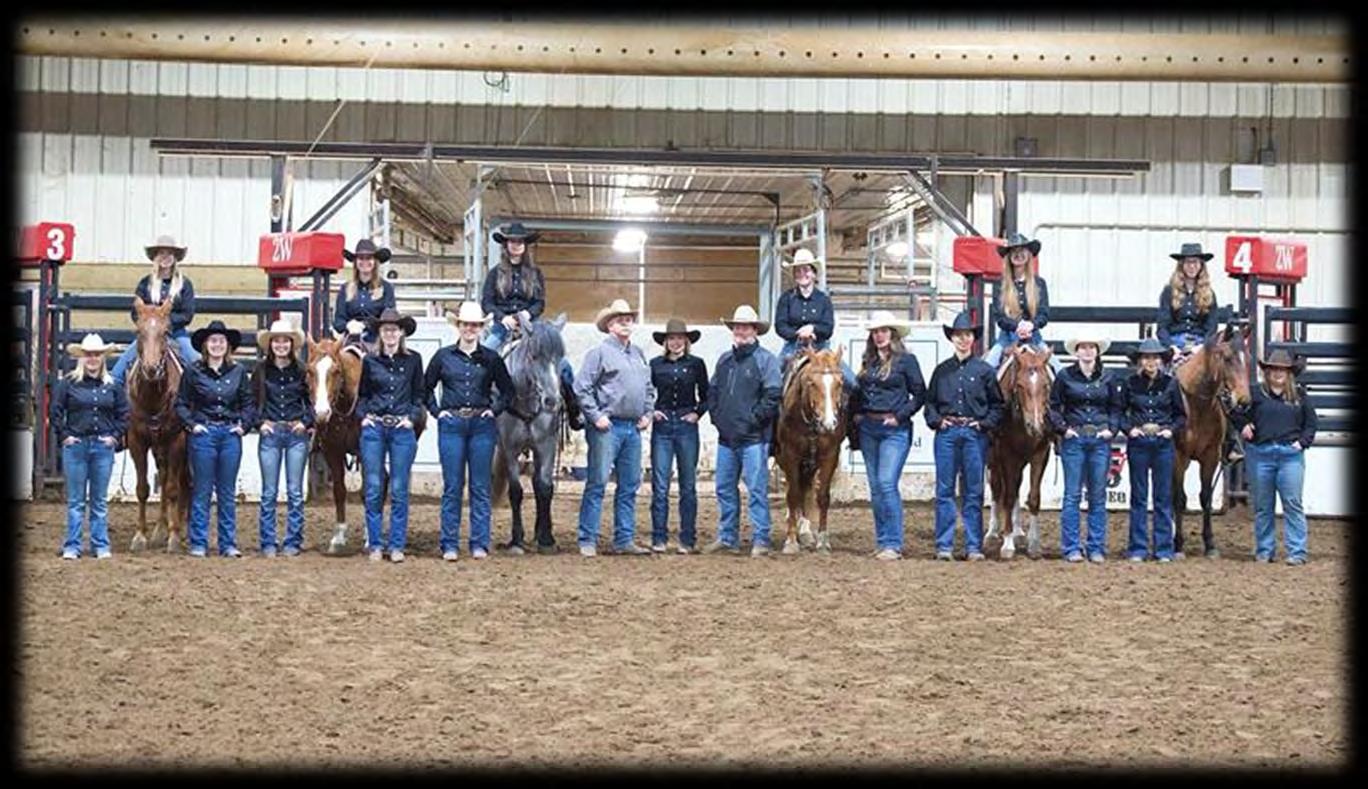
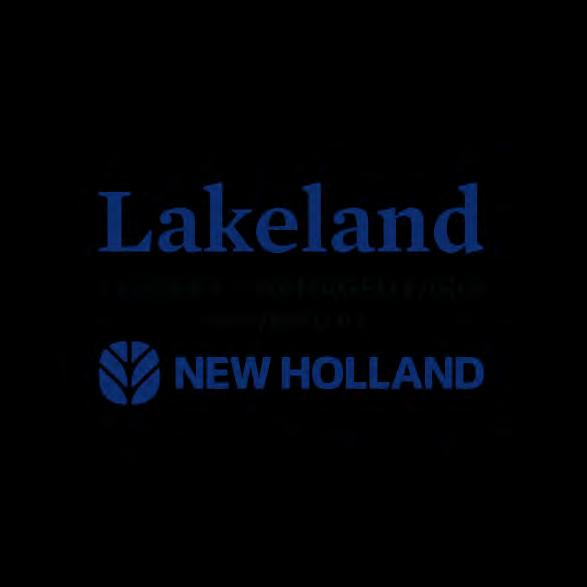
• Faculty Advisor – Ron Hoffman
• Equine Instructor – Matt Rustemeier
• Equine Technician – Bailey Hlus
• General Manager – Alison Hampton
• Public Relations – Laiken Gibson, Lita Crawler
• Finance – Faith Newton
• Roundup – Hailey Nelson, Jenna Moore
• Feed Management – Emily McMillan
• Health Coordinator – Mackenzie Hannas
• Mixed Farm – Willow Harder
• Range and Forage – Lauren Homer
• Stable Management – Caitlyn Arychuk
• Training Records and Reporting – Taylor Waddell
• AQHA Records and Reproduction – Ciara Trautman
• Breeding Management – Charley Tourond
• Secretary – Taylor Swedgan
• Timesheets – Annika Eckervogt-Brewster
• SOP’s – Alia Krueger
Our vision is to produce, select and train quality Quarter Horses with excellent depositions and conformation, in an economically sustainable format.
- Riding the colts consistently by end of November.
- Have a team bonding event with first years before end of first semester.
- Weanlings halter broke quickly and efficiently by November 15th .
- Roping the cows confidently on geldings by Roundup.
- Choose genetics for the broodmare herd by the end of February.
- Expand view on our social medias (Instagram 500 followers) by final presentation.
- Size of team
- Minimal conflict within team
- 100% foal crop
Weaknesses
- Lack of experience in the horse industry
- High input costs
- Number of days off/holiday for training on geldings
- Strong horse market
- Roundup sale and Ranch Horse
Competition
- Contributions to the Tiana Friesen
Memorial Scholarship
- Injury and health risk
- Potential fluctuations in horse market
- Changing demographics in equine industry
- 5 Broodmares
- 1 Started gelding
September Walk/ Trot/ Lope, Trail Obstacles
October Obstacle, Outdoor Riding
November Working Cattle, Roping Heel-o-Matic
January Loping Circles, Working the Flag, Roping Heel-O-Matic
February Working & Tracking Cattle
March Pen Roping
- Performing various tasks like; obstacles, roping and cow work by sale day.
- Leads, collection, flexion, softness, speed control & pattern work.
- Present horses at 6.5 BCS by sale day.
- Sale prices be in the top 15% of market for similar horses with similar training.
- Sell weanlings via soft close Facebook auction.
- Consider fillies for colt team.
- Look at purchasing proven broodmares if unsuccessful this spring.
- Largest income made off weanlings thus far.
- Sale horse for next year consists of 3 mares, 2 geldings.
- Culled open broodmare, plan on purchasing a replacement broodmare.
- Continue with feed management industry connections.
- Watch first year riding labs prior to colt starting process.
- Hold team bonding events with first years consistently throughout the year.



- They had 2 shoeing sessions before the sale.
- 4 out of 5 horses passed their health exams the day before the sale. Jerry slipped at the vet clinic.
- The horses were treated for lice in the beginning of March.
- We administered second and third doses of Pheumobort-K +1b.
- All of them had their feet done.
- All of them were dewormed on April 4th .
- We will vaccinate for strangles and the flue after they deliver their foals.
Thank You to Our Buyers!
- Suzanna Lemay
- Kevin Hilman
- Gord Ziegler
- Chelsy Hunter
- Ken Leskow
- Mike Keeley
- Peter Fuerbringer
- Angie Cross
- Jessica Emmott
- Circle H Quarter Horses
- Frank Gerich
- Megan Reiber
Thank You for Your Support!
- New Holland Agriculture
- Ron Hoffman
- Matt Rustemier
- Tracy Quinton
- Denise Martin
- Kris Lehmann
- Bailey Hlus and Farm Team
- Bevin Hamilton
- Amy Stanley
- Austin Partington
- Janet Kerr
- Nadine Farkash
- Erika Moore
- Country Junction Feeds
- Shady Willows Ranch
- Shenfield Performance Horses
- Weir Veterinary Services
- Delaney Veterinary Services
- Vermilion Veterinary Services

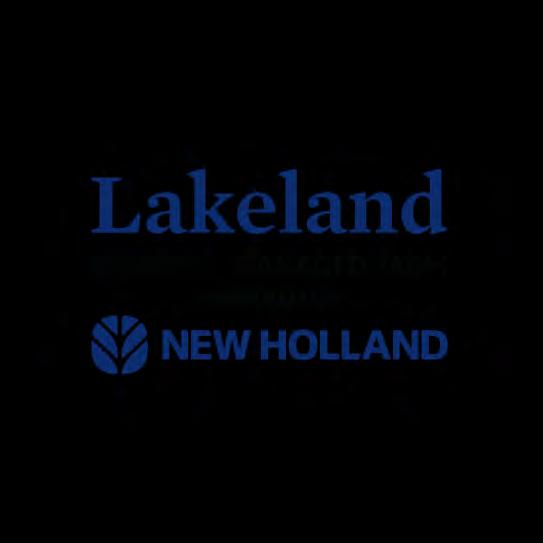
General Manager- Brooklyn Hedley
Round up/Marketing Coordinators- Kamryn Gilliland, Dylan Fuller, Ashley Tolsma
Show Team Coordinators- Isabella Acorn, Chloe Loane
Finance Coordinators- Cheyenne Schwengler, Hana Ring
Nutrition Coordinators- Madison Webster, Casey Thompson
Genetics and Reproduction Coordinators- Hana Ring, Kelsy Weber
Animal Health and Treatment Coordinators- Jayton Corcoran, Cheyenne Schwengler
Range and Forage Coordinator- Carlin Rajotte
Public Relations Coordinator- Lexi Dietrich
Team Bonding and Industry Contact- Chloe Loane
Records and Angus Administration Coordinators- Lara Coleman and Alycia Petersen
Mixed Farm Coordinator- Hulaina Anderson
Herd Vision
“To raise functional, high-quality cattle to suit the needs of both purebred and commercial breeders, while advancing student learning and management”
Strengths (internal)
- Wide variety of experience and diverse knowledge possessed within this years team
- Large team size
- Farm team and advisors provide guidance through mentorship
Weaknesses (internal)
- Small herd size
- High turnover rate in management of the herd
- Calves go on feed later than competing herds
Opportunities (external)
- Semen and embryo donations from producers
- Creating new relationships within the industry
- Market prices have been increasing Threats (external)
- Competition within theAngus breed
- Unpredictable weather
- Public perception
Short Term Goals
- Create strong team dynamics
- Have efficient meetings
- Create opportunities for hands-on learning experience
- Gain a thorough understanding of our herd
Long Term Goals
- Build a productive and high-performance herd
- Create uniformity within the team while expanding the Lakeland College brand
- Build industry contacts
- Purchase new breeding females early in the year
- Have team bonding events once a month
- Start discussion in advance
- Increase the number of purebred lots in the Round Up sale
- Create subcommittees to suggest major decisions to the team

The cost of production for purebred cattle in the 2023-2024 fiscal year amounts to $2.52 per pound of calf weaned, marking a slight increase compared to the previous year's figure of $2.44 per pound. This marginal uptick primarily stems from elevated expenses in yardage, feed, and veterinary services. Looking ahead to the forthcoming year, we anticipate that the cost of production will remain comparable, if not lower, than the current year's expenditures. Breakeven
Year End Cull Sales:
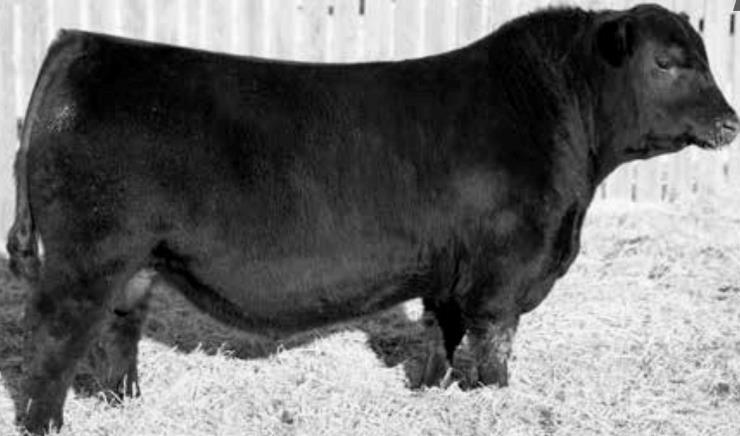
*All embryo and A.I. females will be cleaned up by Greenwood Sold Out 58L
Semen used for 2024
LFE Best Answer 800H (8 head)
Coleman Triumph 9145 (2 head)
SAV Bloodline 9578 (2 head)
SAV Early Arrival (1 head)
Brooking Sooner 0052 (2 head)
SAV Magnify 1107 (7 head)
SAV Rainfall 6846 (6 head)
Red Wilbar Longitude 646Y (2 head)
Embryos used for 2024
W Sunrise 4J x Brooking Black Angel 6024 (6 embryos)
S Titlest x OAV Classy 4Z (3 head)
Lazy MC Straight Ahead 142C x Lazy MC Lazy 17Y (6 embryos)
HF Rosebud 1J x SAV 004 Density 4336 (2 embryos)
HLC Evening Tinge 723H x Coleman Triumph 9145 (1 embryo)
Thank you to our donors for their generous support to our genetics program!
- SchaffAngus Valley
- Lazy MC
- Bohrson Marketing
- D&N Livestock
- Redrich Farms
Breeding Cost Per Service
Management Group
Calves at Birth
Calves
Cows Pre-Calving
Cows Pre-breeding
Vaccinations Cost Per Head
Bovilis Nasalgen 3-PMH
Vitaferst
UltraBac 7/Somubac
Bovi-Shield GOLD One Shot
Scourgaurd
UltraBac 7/ Somubac
Ivomec Pour-On
Bovishield GOLD FP5
(Approx)
(Approx)
UltraBac 7- given livestock as preventative from getting clostridial diseases which are caused by anerobic bacteria
Bovi-Shield GOLD One Shot- given to livestock as preventative from respiratory disease caused by infectious bovine rhinotracheitis (IBR) viruses
Scourguard- given to cows and heifers as an aid to prevent diarrhea in their calves.
Bovi-Shield GOLD FP5- given as an aid in preventing abortion caused by IBR virus and BVD.
Bovilis Nasalgen 3-PMH- Given to calves to help prevent from pneumonia and other respiratory illnesses.
Treatments
Diagnosis
Hardware
Disease/Pneumonia
Treatment options
-Resflor -Excenel
Management Group
-Magnet 13L
Suspected Hardware disease -Magnet -Meloxicam
Scours
-Calf scour bolus
-Resflor
Pregnancy Termination -Estrumate
97E- died October 31st from suspected liver abscesses
38M, 34M, 12 M
Replacement/ Sale Heifers
Sick (depressed) -Resflor -Oxyvet 33L, 6L
Magnet- primarily used to prevent/treat hardware disease in cattle ($4.22/hd)
Meloxicam- Given for alleviation of pain and inflammation ($ 2.86/ml)
Estrumate- termination of normal and abnormal pregnancy with hormones ($ 4.54/hd)
Resflor- antibiotic drug for the treatment of bovine respiratory disease complex. ($ 1.33/ml)
Excenel: Used for bovine respiratory disease and acute bovine interdigital necrobacillosis. ($ 1.65/ml)
Calf scour bolus-antibacterial product for oral use as an aid in the treatment and prevention of scours and enteritis of bacterial origin. ($ 3.60/)
Oxyvet 200 LA: Treatment of infections caused by oxytetracycline susceptible bacteria in cattle ($0.13/ml)
Range and Forage
Total grazing for 2023: $10,854.60
Budgeted $12,524 for the 2024 grazing season
Grazing Plan
- 32 pairs, LC 21: May 15 to September 1
o Pairs will be rotationally grazed and the possibility to use the razor grazer
- 9 pairs and 6 bred heifers in Lee Park from May 18 to November 1
Grazing cost
Pasture Costs
- Pairs - $1.50 per head per day
- Bull - $3.00 per head per day
- Replacement Heifers - $1.10 per head per day
Aftermath
- Dry cows - $1.00 per head per day
- Bred Heifers - $0.83 per head per day

The above chart shows the blend information for LC 4/5. This blend was formulated for 100 acres and to be seeded at a rate of 12.2lbs/acre. 1220lbs of seed is needed and the total cost is $7637.50
- New Holland Agriculture
- Austin Partington
- Kris (Leroy) Lehmann
- Kyle Hafner
- Jayden Cramer
- Justin Kane
- April Warrilow
- Dr. Tim Goodbrand
- Dr. Rob Stables
- Ryley Noble
- Lakeland College Marketing Department
- Denise Martin
- Sharon Reiter
- Tracy Quinton
- Bevin Hamilton
- Janet Kerr
- Amy Stanley
- Jolet Van Neikerk
- Erika Moore
- Marisa Schuebel
- Ron Hoffman
- Schaff Angus Valley
- Select Sires
- Bohrson Marketing
- Commercial Beef Unit
- Extensive Grazing Unit
- Bison Unit
- Equine Unit
- Dairy Unit


Keifer Gidych - General Manager, Range and Forage Coordinator
Keara Cramer - Facilities Coordination, Mixed Farms Coordinator, Research Coordinator
Sarah McClelland - Finance Coordinator, Marketing Coordinator
Alexis Wowk - Nutrition Coordinator, Public Relations Coordinator
Paige Gingrich - Health Coordinator, Records Coordinator, Animal Care Coordinator
Erika Moore - Faculty Advisor
Vision and Mission Statement
“Our vision is to establish a foundation for a productive and profitable bison heard. We aim to achieve this through education, improved pasture management and contribution to the bison industry.”
Short-Term Goals
• Net profit/loss management
• Develop strong industry connections.
Long-Term Goals
• Increased pasture productivity
• Continuing to establish a strong foundation for future SMF teams.
Strengths
o Optimal herd size
o Land availability
o Working relationships
Opportunities
o Industry support
o Increased demand
o Direct marketing
o Educate the public
Weaknesses
o Multiple roles
o Watering system
o Pasture production
o Interior cross fencing
Threats
o Drought
o Late snowfall
o Niche market
o Limited resources
119 Cows; 24 First time calvers
10 Replacement heifers 9 Bulls
• Attend CBA & BPA conventions.
• Purchase breeding bulls
• Continue to network.
• Keep some heifer calves back for replacements.
Our year-to-date feed costs are $79,807.73 total. This was due to having to feed earlier in the year due to pasture health Our current feed costs this semester are $23,713.95. Our cost per day this year is a fluctuates between $2.00 - $3.17 per head/day.
• The current ration being fed based on animal requirements of 1.8% dry matter in bodyweight per day, which will raise closer to 2.7% in late gestation and remain high until late fall. (Current ration averages 27lbs for bulls and 18lbs for cows of dry matter)
• Feeding multiple types of grass-mix hay with pea or barley straw in 2:1 rate, which is about 3700lbs per day total.
• Feeding Northern Bison Mineral and blue cobalt salt free choice, we have good consumption levels in the herd.
• Bale shredding daily while mixing hay and straw to decrease selective feeding.
• Plan on feeding into May and then supplement as needed. We are delaying grazing to allow pasture growth and rejuvenation to help increase pasture health.
• We lost three calves this year; one was stillborn, one due to predation after losing its mother and another was lost during processing
• We lost two cows; one died fighting to get unstuck from a mud pit and the other was euthanized after being in poor condition and self-isolating for several weeks.
• Last November we vaccinated our calves with; Vison 8 Somnus, to protect against clostridial diseases and dewormed with Bimectin, an injectable form of ivermectin, a broad-spectrum dewormer that provides coverage for all common internal worms affecting bison.
o We consulted with Dr. Goodbrand from Vermilion Veterinary Clinic and Dr. Gerald Hauer to create a vaccination plan for our herd.
• We vaccinated and dewormed our cows and bulls this January when the herd was brough in for pregnancy detection with Dr. Weir.
o Our injectable dewormer froze due to extreme temperatures and we had to switch to a pour-on version.
This cost of production allocates all of feed costs as well any other costs associated with raising a calf. This would equate to around $651.20 per calf with an average weight of 570lbs, making our total for raising our calf crop ~$93772.80.
The current land base includes eight quarter sections that have perimeter fencing for bison and includes a handling facility in LCP 31. The herd is currently being fed on LCP 31. We have LCP 27, 29, 30, 31, 32, 33 and 34 available to us for grazing. LCP 28 is currently being leased. LCP 27 was grazed by the Extensive Grazing Commercial Beef Unit in the 2023 season, so we are letting it rest for pasture production and biosecurity purposes before we graze it in late 2024.
Grazing Costs
2023/2024 grazing season
• Projected: $60,400.00
• Actual: $60,376.28
• Days of grazing: 152
• The plan for the 2023 grazing season was to rotationally graze the herd; the grazing plan was not able to be followed due to the drought and lack of forage. Based on 152 days at:
$1.59/head/day
2024/2025 grazing season
• Projected: $43,371
• Days of grazing: 183
Based on 183 days at:
$1.50/head/day cows and calves over 6 months of age
$3.00/head/day for bulls
Proposed Grazing Plan
Days in paddock & rotations
N1/2 LCP 31
• April 1st - June 17th
LCP 32
• June 17th – July 1st
• August 26th – September 9th
LCP 33 & 34
• July 1st – July 29th
• September 9th – October 7th
LCP 29 & 30
• July 29th – August 26th
• October 7th – November 4th
SW LCP 31 & Handling Facility
• November 4th – 11th
LCP 27
• End of season as stockpiled forage to extend grazing days.
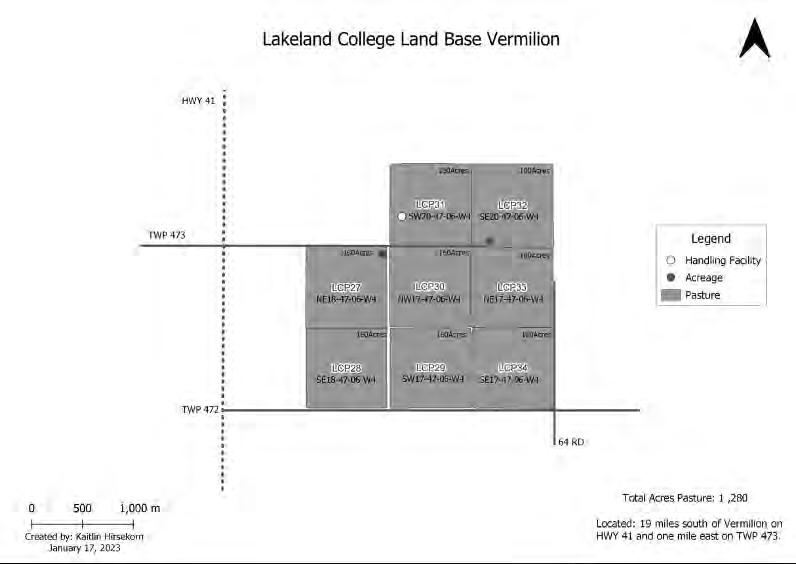
We have a functioning handling system located in LCP31. This system is outdated and needs upgrades. Some upgrades that are completed are a catwalk which increases our safety and allows us to work above the bison. This is located before the box alley. A new squeeze is the most valued upgrade that we need. This will allow the animal to be contain and at a lower level of stress while having handlers around. This also will improve the safety of the handlers. Another upgrade that should be done is fencing the quarter lines with bison fencing. This will allow for proper grazing management. With having pastures divided we need water access in each section, we currently have a water bowl in LCP 31 and LCP 32. The best place for another water bowl is on the south end of the pastures between LCP 29 and LCP 34. Due to the dry years the dugouts have dried up so there are only two places where the bison can have access to water.
With these upgrades completed it will allow for smoother flow of animals. It will lower the stress of the animal and increase safety for all involved. It will also allow for proper grazing management of the vegetation that we have. If we do have water access from most quarters, then rotational grazing can be out into place which allows for the best possible nutrients to be absorbed by the animals and keep the vegetation healthy.
Suggested upgrades:
• Improved safety latches
• New hydraulic squeeze
• Curved alley
• Not so sharp corners
• Fencing on quarter lines
• Dig deeper and more dugouts
This year we have chosen to sell our calves through an online video auction with Jack Auction Group based in Saskatchewan. We chose to sell through auction as they were able to allow us into their December 7th sale. Our caves had sold for $2.14/lb for our bull calves and $1.30/lb for our heifer calves.
Earlier this year we had completed our herd management; we had done this due to our poor pasture production as well as our poor water output. While doing our herd management we had decided to sell our cull cows which consisted of 50 pregnant cows and 20 open cows. Through a private sale, this is because some cows that we were selling were pregnant and we had a set date of February 28th as the last day our animals could be handled or trucked to prevent any late term abortions and to minimize stress on the animals.

@lakeland_smf_bison
Our Instagram page has grown 88 followers with total of 251 followers, 289 likes over 7 posts. We reached 1.0k users, our profile had 328 user visits. Our top post was our processing reel with 971 views and 55 likes.

@Lakeland College SMF Bison Unit
Our Facebook page has grown 35 followers with a total of 235 followers, 140 likes over 11 posts and reached 4,340 users. Our top post was from January 16 and reached 3521 users with 27 likes
As of April 3, 2024
• Fix the cross-fencing on the quarter lines with bison fencing and upgrade the gates.
• Update the tagging system during processing.
• Keep back 10 replacement heifers for future breeding stock.
• Replace the bottom half of the bulls at weaning and replace them in the spring.
• Pasture rejuvenation with a focus on weedy disturbance control.
Armin and Rita Mueller and Family
Erika Moore
Kris (Leroy) Lehmann
Jayden Cramer
Farm Team
Marisa Schubel
Nadine Farkash
Denise Martin
Janet Kerr
Amy Stanley
Austin Partington
Tracy Quinton
Bevin Hamilton
Gerald Hauer
Trisha Mechor
Sharon Reiter
New Holland Agriculture
Brennin Jack and Jack Auction Group
Bruce Downey
Dr. Goodbrand and the Vermilion Veterinary Clinic
Dr. Kent Weir and Weir Veterinary Services
Dean Andres
White Mud Farms Ltd
Cramer By-son
Irish Creek Bison
K & L Quarter Horses
Bar J. L. Enterprises
Lee Arthur
Pilates Ranches
Spruce Point Valley Bison
Bison Producers of Alberta
Canadian Bison Association
Myron Wigness
Hi-Hog
Murray Feist
Lyle Froelich
Lykele Miedem



Harleigh Carlson- General Manager and Public Relations
Jasmyne Peters- Finance Coordinator
Samantha Simonson- Secretary and Range & Forage Coordinator
Aspen McTaggart- Nutrition Coordinator
Bailey Dmytriw- Mixed Farm Coordinator, SOP’s and Animal Care
Eliza Anderson- Health and Treatment and Records coordinator
Emily Rumpf- Marketing, Research and Round-Up Coordinator
Ashley Garrioch- Facilities and Reproduction Coordinator
Marisa Scheubel- Faculty Advisor
This year's team is made up of 8 students from across Manitoba, Saskatchewan and Alberta. We are working towards sustainably maintain an economically viable, extensive herd while exploring various cattle management practices. Our mission is to sustainably manage an extensive, low maintenance, strong maternal cow herd with a vast amount of information regarding the animal’s background data, breed composition and management system data to apply to a larger scale low input operations in order to improve management practices.
• Put engravable tags in replacement heifers
• Revaluate selling bred heifers in the RoundUp Sale
• Buy a new Hereford bull
• Continue working closely with the Research Department
• Team size
• Willing to learn and help with anything
• Our herd is genetically bred to thrive in our management practices
• Lack of exposure to public
• Time management
• High calf prices
• Heifer Selection Trial with Dr. Susan Markus
• Swath grazing trial with Dr. Obioha
This is the heifer cost breakdown.
• Feed prices
• Land availability
• Drought
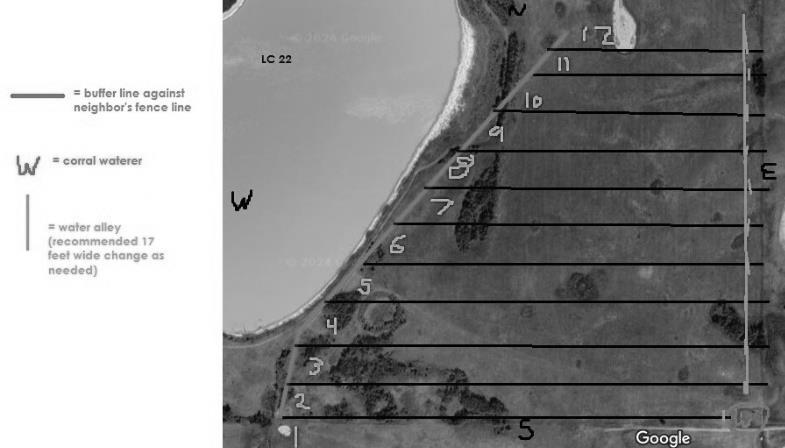
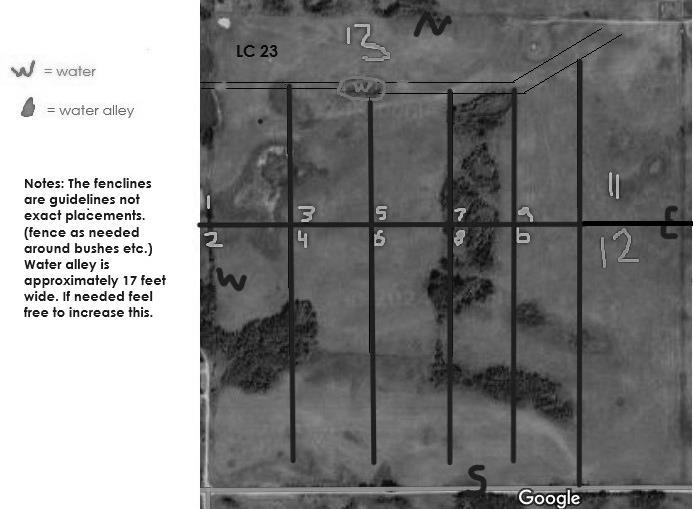
Pictured to the right is the pie chart for our grazing costs in 2023/2024. As you can see most of our costs came from pasture grazing. On our budget for next year, we allotted $27,500 for pasture grazing and $17,500 for annual crop grazing. Annual crop grazing will cover corn grazing, aftermath grazing and swath grazing.
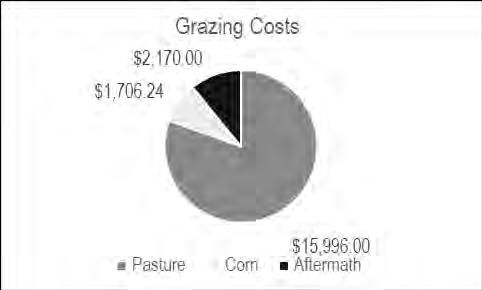
Nutrition
All values in lbs/head/day

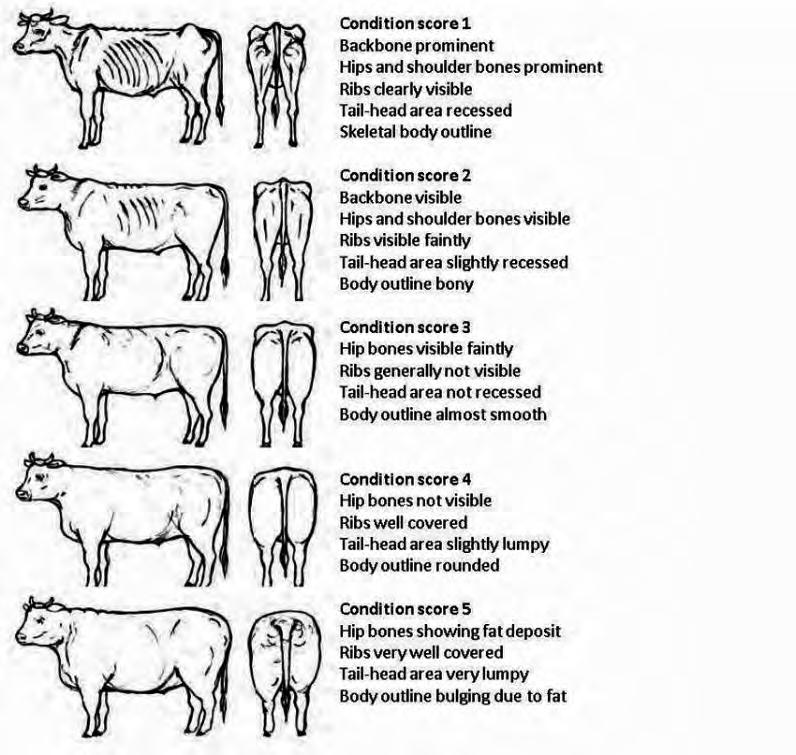
Body condition scoring should be a big part of everyone’s herd ABC’s as it is a tool to ensure that cows are happy and healthy. The industry standard is 3.5-4. anything lower than this is not receiving enough essential nutrients to be able to maintain/put on weight. Anything higher than 4 is considered overweight this can mean producers are over feeding or these bigger girls are pushing the smaller animals out of the way. The above infographic better explains body condition scoring along with giving photo reference.
This data is from September 1, 2023 until March 31, 2024
New Followers

Page Reach Page Visits

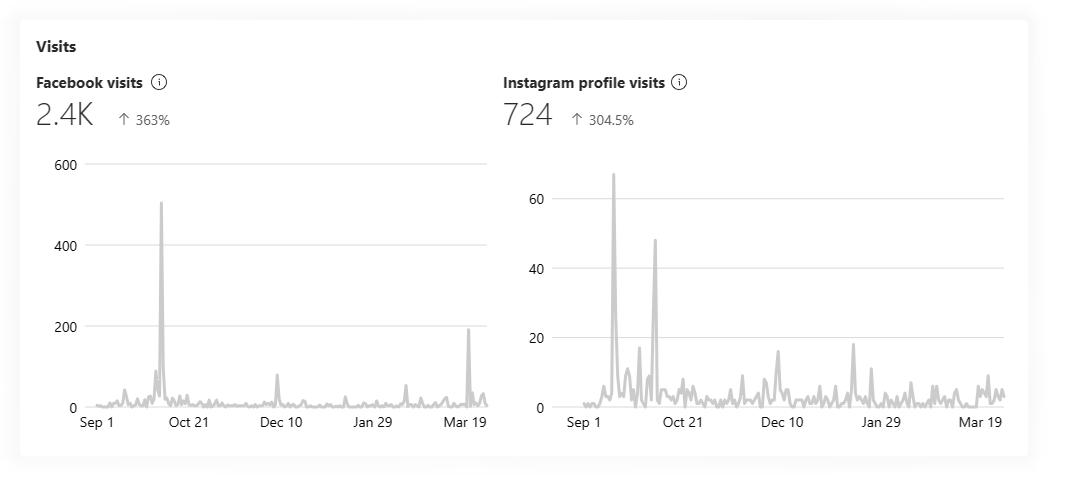
• New Holland Agriculture
• Marisa Schuebel
• Kyle Hafner
• Kris (Leroy) Lehmann
• Tracy Quinton
• Research Department
• Obioha Durunna
• Susan Markus
• Doug’s Backhoe Service
• AgZone
• Rod and Bernadette Nikkel
• Steve Kenyon- Greener Pastures Ranching
• Spencer Letts
• Morinville Colony
• Farm Team
• Bailey Hlus
• Wylee Squair
• Walker Balan
• Justin Kane
• Jayden Cramer
• Ag Faculty
• Amy Stanley
• Nadine Farkash
• Austin Partington
• Janet Kerr
• Denise Martin
• NorthStar Genetics
• Vermilion Livestock Exchange
• Range Ward
• Diamond K Customs
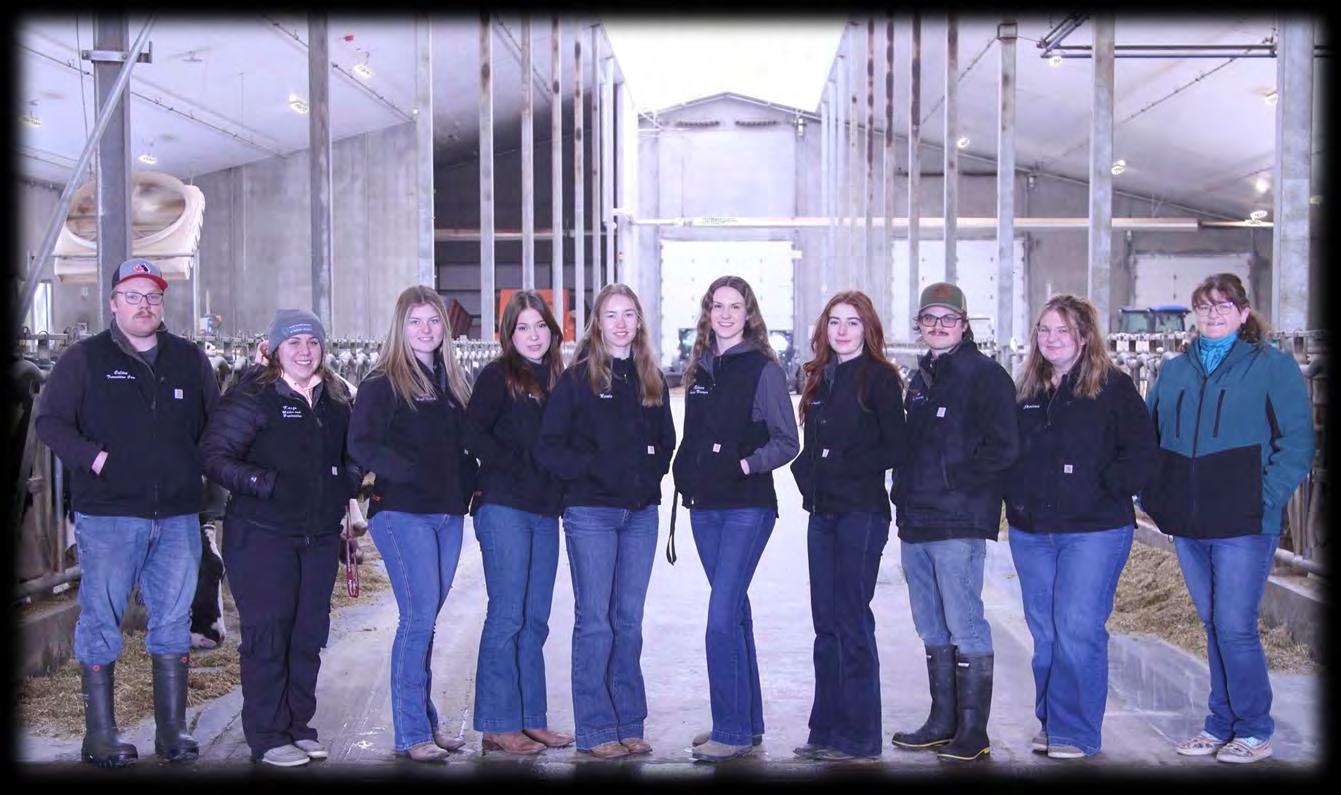
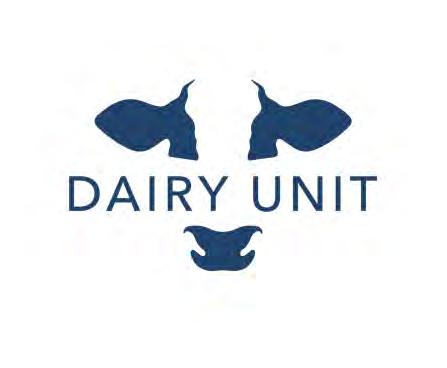

General Manager
Rebecca DeJong
Mixed Farm/Records/ SOP Coordinator
Nicole Elliker
Finance Coordinator
Feed Management Coordinator
Jack Link
Herd Health Coordinator
Jaymie Bysterveld
Cassidy Porteous Udder Health and Production Coordinator
Transition Cow/ Range and Forage Coordinator
Colten McAvoy
Calf Management Coordinator
Stephanie Messerli
Kasja Bowman
Public Relations Coordinator
Gelsey Bikker
SMF Advisor
Jessica Emmott
Farm Team
Amber Sayers - Dairy Barn Manager
Madison Smith - Dairy Herdsperson
Loue Reales – Dairy Herdsperson
“We strive to produce quality milk and raise healthy animals, focusing on production and efficiency, while gaining skills and knowledge to be used in the dairy industry”
Team Goals
Accomplished
▪ Genetic diversity
▪ Corn silage demo recommendation
▪ Feed inventory plan
Ongoing
▪ Transition cow health
▪ Decreased services per conception
▪ Increased pregnancy rates
Recommendations
▪ Continued genetic diversity
▪ Pasture plan
▪ Western Canadian Dairy News participation
▪ Heifer edema management
Strengths
• Diverse knowledge
• SCC improvements
• Genetic improvement
• Milk quality
Opportunities
• Sponsorships
• WCDS
• Embryos / semen selection
• Community outreach
Weaknesses
• Student presence / availability
• Feed consistency
• Underfilling quota
• Future replacements
Threats
• Climate fluctuations
• Equipment depreciation
• Political influences / changes
• Inflation of services and goods
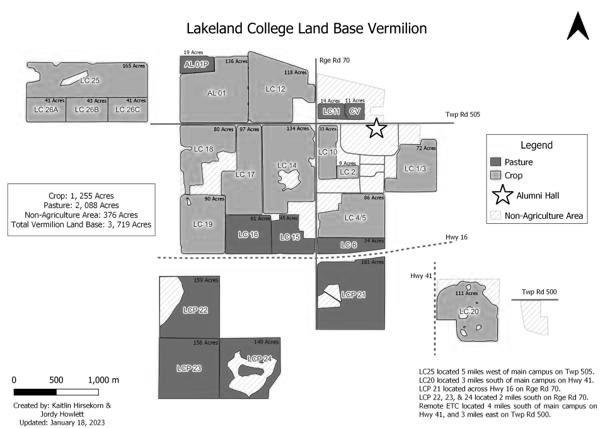
Budget
to remain similar considering that this category includes the rebates, discounts and loyalty discounts that are received with UFA, Penner, and most notably our loyalty discount through the Leduc Vet on select treatments and drugs.
Forecasting calf sales to decrease compared to the 23/24 fiscal year under the consideration of drought and potential for higher culling rates on our heifers, also higher use of sexed semen to ensure the stability of the farm once the drought passes.
Through the DDPP I predict that due to the potential shortage of feed and lower amount of milking cows that are predicted for the herd, I have decreased the income budget by 10%.
Projected decrease of 5% based on the potential drought. The conditions will make feed difficult to come by and thus others in industry will not want to feed extra animals. We also attribute this decrease to the low demand.
A recommendation that will be left to the 24/25 Dairy Unit is to continue with harsh culling on heifers as well as cows that do not fit within our herd goals; because of this, we forecast that heifer sales should increase by roughly 15% regardless of market fluctuation.
Milk sales should remain relatively steady through the year as our production and quality continues to climb. This will hopefully remain unaffected because of feed shortage. (deductions not included)
We forecast for the health budget to increase by 5% for the next fiscal year under the consideration that fuel prices will increase as well as the price of drugs and medical supplies.
Under the consideration of drought, we forecast feed to increase in price due to scarcity of the products. We also
attribute feed expenses to increase due to the possibility of bringing in alternatives that may cost more to feed.
Seed has already been purchased and the budget that was created for us includes the cost for the fencing and water sources that will need to be installed. The fence has yet to be purchased at this point so none of the budget has been used. We budgeted 2000 dollars for next year's team to pursue the pasture project.
Predict this cost to increase by 3% due to the higher use of sexed semen and the potential use of different semen companies to increase the genetic diversity of the herd.
We do not foresee an increase in hoof health issues under the consideration that the current hoof care is working well within the herd and is well under control. Should the 24/25 Dairy Unit continue to follow these steps to ensure adequate hoof health procedures are being followed. there should be no increase in cost.
The budget for chemicals and cleaners for the last 2 fiscal years has been severely over budgeted for. Using the 23/24 fiscal year's expended amount and increasing it by 3% should allow for enough room for the inflation of some of the chemicals and cleaners that the barn uses.
The records budget is severely overbudgeted over the course of the past 2 years. We forecast that this budget will remain roughly the same as the 23/24 fiscal year's expenditures; however, we leave an increase of 1.5% to account for a potential increase in heifer calves due to sexed semen as well as 1st lactation classification numbers rising.
We predict an increase of 7% simply due to the increase age of the barn and the equipment inside likely requiring more frequent maintenance. (Manure pump, Vector, AMS, Parlor, etc.)
The Westerner Dairy Showcase expenses include show supplies, for the calves as well as for the stall/display and
fuel to and from the show for the trucking of the heifers. We do not forecast this amount to increase under the consideration that new supplies were purchased this year.
We received an unforeseen increase on our invoice for manure handling the 23/24 fiscal year and there for have budget for next year to see an increase similarly. The budget has increased by 12% to accommodate for potential inflation.
We have removed 50% of the livestock purchasing budget due to the threat of near certain drought. The 24/25 Dairy Unit should also focus more on the conception rates in the current stock and improvement of genetic diversity by breeding strategies compared to the purchasing of new stock.
We forecast the prices to remain roughly the same for next year's team under the consideration of the prices being like last years. This expense was not budget for in the 22/23 year making the comparison of yearly fluctuations not possible.
Last year's team over budgeted for the deductions on milk shipments for the 23/24 fiscal year; therefore, we leave a 5% increase on the projected expense for milk deductions for the 24/25 fiscal year from the expended amount through 2324.
Definitions
A.F: As fed
ADG: Average daily gain
Close-up: A cow that is due to calve in 14 days
Calf: Bovine that is newborn to 3 months of age
Conception rate: Cows confirmed pregnant out of total cows bred
Cross sucking: Calf sucking on any body part of their pen mates, occurring in post or pre weaning
Culls: Animals that will be leaving/left the herd
DA: Displaced Abomasum
DDPP: Dairy Direct Payment Program
DLC: Dairy Learning Centre
DM: Dry matter
Dry cow: Cow that is not producing milk
Fresh cow: Bovine that has calved up to 21 days after calving
Heifer: Bovine that is 3 months to 12 months of age
Heat detection rate: Number of cows bred out of total cow eligible
Ketosis: Metabolic disease that occurs during the transition phase
KPI: Key performance indicator
Lactating cow: A cow that has calved and produces milk
LPI: Lifetime production index. This is a tool that has that has more emphasis on type rather than production. Which leads to a balanced response for production, durability, health and fertility.
Mastitis: Infectious disease that affects the quarter of the cows udder, caused by bacteria entering the teat end
Milk fever: Metabolic disorder caused by insufficient calcium
Milk deductions: Cost associated with milk sales
Pneumonia: Respiratory disease commonly occurring in young animals
RP: Retained placenta
Retained placenta: Retention of fetal membranes that cause infection after calving
Scours: Diarrhea accompanied by a fever
SMF: Student Managed Farm
Silage: Fermented feed
SCC: Somatic cell count; the amount of bacteria in the milk (max allowable is 250,000)
TMR: Total mixed ration
YTD: Year to date
Agrai Dairy Mart (DeLaval)
Dairy Lane Systems
Groovin’ Gord
New Holland Agriculture
Chinook Farm Innovations
Western Canadian Dairy News
Penner Farm Service (Lely)
Koos Vis
Alberta Milk
Holstein Canada
Lactanet
Tyson Flaman
Joe Spichtig
Triple M Dairies
All other SMF units
Jessica Emmott
Madison Smith
Loue Reales
Jolet van Niekerk
Amber Sayers
Farm Team
Kris (Leroy) Lehmann
Facilities Team
Denise Martin
Trisha Mechor
Tracey Quinton
Austin Partington
Amy Stanley
Nadine Farkash
Erica Moore
Janet Kerr
Marisa Scheubel
Bevin Hamilton
Ron Hoffman
Lakeland College
Marketing Team
Carson Klugkist
WestGen
Maggie Williamson
Jason Sawatzky
Travis Fehr
Nutrisource
Farmers Depot
WCDS Committee
Thank you to the following businesses and individuals who supported out students’ learning this year:
Quarter Cuts
Staden Farms
Derek and Chelsy Westman
MJT Cattle Company
Vermilion Livestock Exchange
Rietveld Holsteins
Plain Lake Hutterite Colony
Brett and Jessica Flanders
Laurie Fischer-Fries
Dr. Cordell Young
Javier Bahamon (Alberta Pork)
AN 335 Practicum placements
Mike Hittinger
Darren Hipkin
Tyson Flaman
Bob Reck
Chinook Farm Services
Morgan Holben
Randy Borysiuk
Zuidhof Feeders
Shelter Valley Feedyards
MCF Feeders
Dargis Land and Cattle
Highland Feeders
Bouvry Exports
TFS Expanse Feedlot
Gilbraith Farm Services
Chad Meunier
Titan Land and Cattle
Corview Farms
Dale and Marsha Cattle
Specht Farms
VeeTee Feeders
GW Murray Ranches
Primrose Livestock
Namaka Farms Ltd.
Gem Stone Cattle Company
Triple H Farms
M and L Nyal Farms
Schmidt Livestock
Mile 14 Holdings
Jim Grilock
Stronks Feedlot Ltd.
Herb Stanley
Lawrence & Maureen Ference
Alison Weaver
Sunhaven Farms
Jessica and Brett Flanders
Jennifer Marins
Sheep and Stuff (Regan Smith)
Double L Farms (Royce Lodeon)
University of Alberta DRTC